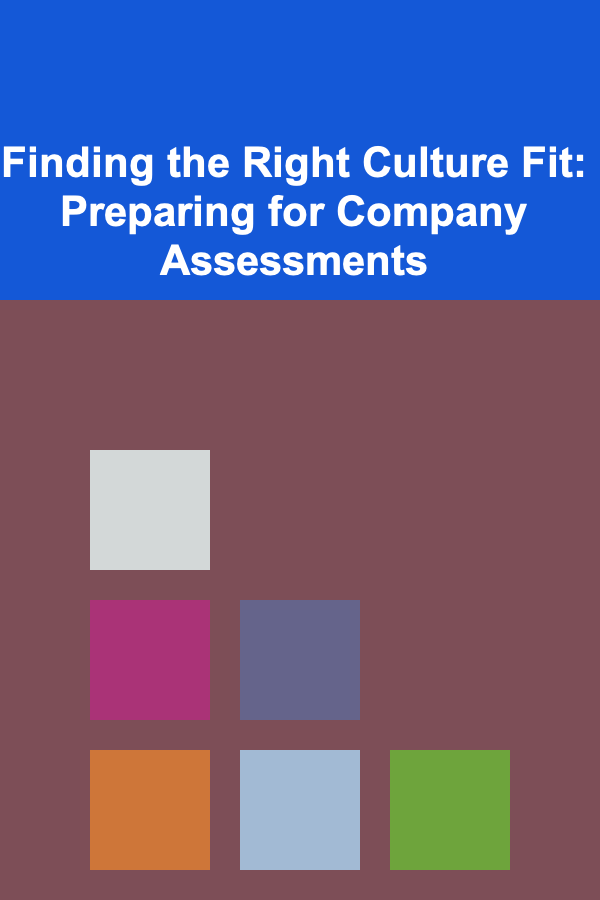
Finding the Right Culture Fit: Preparing for Company Assessments
ebook include PDF & Audio bundle (Micro Guide)
$12.99$6.99
Limited Time Offer! Order within the next:

When it comes to securing a job, technical skills and experience often take the spotlight. But there's another crucial factor that can determine whether you're a successful long-term employee: cultural fit. In fact, company culture plays a significant role in shaping the employee experience, influencing everything from job satisfaction and work-life balance to collaboration and overall success.
In today's highly competitive job market, companies have become more aware of the importance of hiring individuals who align well with their organizational culture. That's where company assessments come into play --- they're designed to evaluate whether you're not only qualified for the role but also a good match for the company's values, work style, and goals.
This actionable guide will delve into why company culture is important, how to prepare for company assessments, and how to ensure you find the right cultural fit to thrive in your next role.
Why Culture Fit Matters
Before diving into the specifics of preparing for company assessments, it's essential to understand why culture fit is so crucial in the first place.
1. Job Satisfaction and Longevity
When your values and work preferences align with a company's culture, you're more likely to experience job satisfaction. Employees who fit well within the organization tend to feel a greater sense of belonging, making it easier to stay motivated and engaged. This alignment can lead to a longer tenure at the company, as opposed to employees who struggle to adjust to an environment that doesn't suit them.
2. Productivity and Collaboration
A strong culture fit often leads to smoother collaboration. If you share the same values and communication styles as your colleagues, you'll be better equipped to work together effectively. Additionally, understanding the company's approach to problem-solving and decision-making will enhance your ability to contribute meaningfully to the team.
3. Reduced Turnover
Companies invest heavily in recruitment and training, so high employee turnover is both costly and disruptive. Hiring individuals who are a good cultural fit reduces the chances of dissatisfaction and early resignation, which helps maintain stability within teams.
4. Company Success
When all employees are aligned with the organization's culture, they work toward the same objectives. This alignment fosters a sense of unity, propelling the company toward its goals. A team of culturally cohesive employees is often more efficient, innovative, and engaged in driving business success.
Understanding Company Assessments
Company assessments, also referred to as cultural fit assessments or personality assessments, are designed to help employers evaluate how well candidates align with the company's values and work environment. These assessments may take many forms, including:
- Personality Tests: These evaluate your traits, preferences, and working styles to determine whether they align with the company's culture.
- Behavioral Interviews: These interviews ask questions about how you've responded to specific situations in the past to predict how you might behave in similar scenarios at the new company.
- Situational Judgment Tests: These tests assess your decision-making and problem-solving skills in hypothetical work scenarios.
- Group Assessments: These involve interacting with other candidates to gauge how well you collaborate, communicate, and fit into a team setting.
- Work Samples: Some companies will ask you to complete a task or project to assess not only your technical abilities but also your approach to problem-solving and work style.
These assessments are an integral part of the hiring process, especially for remote or distributed teams where cultural fit is a major factor in determining how well candidates can integrate into the team dynamics.
How to Prepare for Company Assessments
1. Understand the Company's Culture
The first step in preparing for any company assessment is to thoroughly research the organization. Knowing the company's culture will help you tailor your responses to demonstrate that you're a strong fit. Some effective ways to research the culture include:
- Visit the company website: Look for the "About Us" section, as it often includes the company's mission, values, and vision. Pay attention to the language used and any mention of teamwork, innovation, or work-life balance.
- Check social media and employee reviews: Platforms like LinkedIn, Glassdoor, and Indeed offer insights into company culture from current or past employees. Read reviews about work environment, leadership style, and team dynamics to get a sense of what it's like to work there.
- Connect with current employees: If possible, reach out to employees via LinkedIn to ask about the company culture. This gives you firsthand insight into their day-to-day experience and expectations.
- Look for press releases and media coverage: These sources can provide valuable information about the company's public image, industry positioning, and values.
By understanding the company's core principles and how they align with your own, you can better prepare for the cultural fit assessment portion of the hiring process.
2. Align Your Personal Values with the Company's Values
Once you've gathered insights about the company's culture, reflect on how your own values align. Many companies seek employees who share their core beliefs and principles. For example, if a company places high value on sustainability, you could highlight your own commitment to environmental causes or how you've supported similar initiatives in previous roles.
When preparing for interviews or assessments, be sure to:
- Identify key company values: Make a list of the values the company emphasizes (e.g., teamwork, innovation, customer-centricity) and consider how your personal values align.
- Prepare real-life examples: Think about your past work experiences and how they reflect the company's values. Be ready to share these examples during interviews to demonstrate that you align with the company's culture.
3. Emphasize Soft Skills and Emotional Intelligence
Soft skills such as communication, adaptability, empathy, and teamwork are often a significant part of cultural fit assessments. In remote work environments, these skills become even more important, as employees may not have face-to-face interactions and will rely heavily on digital communication.
To showcase these skills during your assessment, consider the following:
- Communication: Clearly express your thoughts, actively listen to others, and adjust your communication style based on the audience.
- Collaboration: Demonstrate how you've successfully worked in teams, especially in virtual or remote settings. Provide examples of how you've contributed to group discussions, supported colleagues, and resolved conflicts.
- Problem-solving: Showcase your ability to think critically and approach problems with a solution-oriented mindset. Highlight any innovative approaches or creative solutions you've implemented in past roles.
- Flexibility: Share examples of times when you adapted to changing circumstances, learned new tools, or handled uncertainty. Remote work often requires employees to pivot quickly and handle new challenges with ease.
4. Prepare for Behavioral and Situational Questions
Many company assessments involve behavioral and situational questions, where you'll be asked to describe past experiences and how you handled specific scenarios. These questions help assess your cultural fit by evaluating how your behavior aligns with the company's expectations.
To prepare for these questions:
-
Use the STAR method: For each behavioral question, use the STAR method to structure your response:
- Situation: Describe the context of the situation.
- Task: Explain what you needed to accomplish.
- Action: Discuss the actions you took to resolve the issue.
- Result: Share the outcomes of your actions.
-
Tailor your responses: Focus on experiences that highlight your alignment with the company's culture. For example, if the company values teamwork, share a story where you collaborated successfully to achieve a goal.
5. Practice and Seek Feedback
The more you practice for company assessments, the more confident you'll be during the real thing. Conduct mock assessments with a trusted friend, mentor, or career coach. Request feedback on your responses, particularly regarding how well you align with the company's culture.
Consider asking for feedback on your:
- Communication style (Is it clear and concise? Do you effectively engage your audience?)
- Problem-solving approach (Do you present logical, well-thought-out solutions?)
- Emotional intelligence (Do you show empathy and awareness of others' feelings?)
Getting feedback from others can provide valuable insights and help refine your approach before the actual assessment.
Final Thoughts: Cultural Fit for Long-Term Success
Finding the right cultural fit isn't just about passing an assessment --- it's about ensuring that you can thrive in an environment that aligns with your values, work style, and personal goals. Company assessments serve as a tool for both employers and candidates to assess this fit. By researching the company, reflecting on your own values, honing your soft skills, and preparing for assessments, you set yourself up for success in securing a role that offers personal and professional fulfillment.
Remember, cultural fit is a two-way street. While it's important to adapt to a company's culture, it's equally essential to be in an environment where you feel supported, valued, and motivated to do your best work. By preparing for company assessments with this mindset, you'll increase your chances of finding a role that aligns with both your aspirations and the company's needs.
Reading More From Our Other Websites
- [Mindful Eating Tip 101] Best Guided Meditation Scripts for Enhancing Mindful Eating at Home
- [Stamp Making Tip 101] Best Stamp Making for Business Branding: Building a Professional Image
- [Personal Care Tips 101] How to Use a Conditioner for Hair Growth and Thickness
- [Home Maintenance 101] How to Maintain Your Home's Fire Extinguishers and Smoke Alarms
- [Organization Tip 101] How to Create a Relaxing Atmosphere with Organized Space
- [Organization Tip 101] Why a Clean Home Boosts Productivity
- [Home Security 101] How to Make Your Home More Secure with Simple Landscaping Changes
- [Personal Care Tips 101] How to Choose a Body Spray for Different Seasons
- [Organization Tip 101] How to Create a Backup Supply Kit for Emergencies
- [Toy Making Tip 101] Best Tools and Templates for Crafting Intricate Puzzle Toys from Bamboo

Building and Sustaining Strong Client Bonds: A Practical Guide for Client Relations Managers
Read More
How to Involve Your Family in Budgeting Discussions
Read More
How to Make Money Online as a Network Administrator: 10 Actionable Ideas
Read More
How to Update Your Home's Exterior Without Spending Too Much
Read More
How To Shoot Wedding Videos That Impress
Read MoreVariable Expenses Tracker: Mastering the Envelope System
Read MoreOther Products

Building and Sustaining Strong Client Bonds: A Practical Guide for Client Relations Managers
Read More
How to Involve Your Family in Budgeting Discussions
Read More
How to Make Money Online as a Network Administrator: 10 Actionable Ideas
Read More
How to Update Your Home's Exterior Without Spending Too Much
Read More